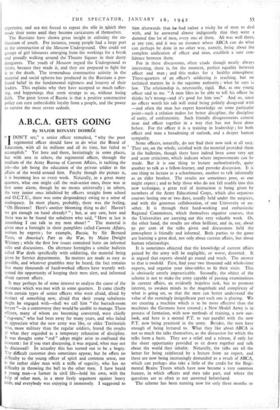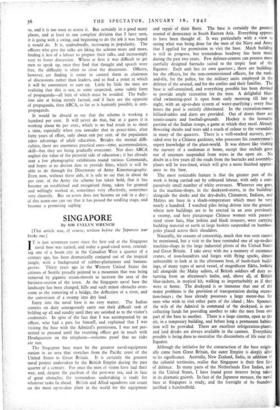A.B.C.A. GETS GOING
By MAJOR BONAMY DOBRiE DON'T see," a senior officer remarked, "why the poor
I regimental officer should have to do what the Board of Education, with all its millions and all its time, has failed to accomplish." Yet here and there, hesitatingly in some places, but with zest in others, the regimental officer, through the medium of the Army Bureau of Current Affairs, is tackling the job—the job being the education of the private soldier in the affairs of the world around him. Patchy though the picture is, it is becoming less so every week. Naturally, in a great many quarters, what one might call the mid-senior ones, there was at first some alarm, though by no means universally ; in others, the very junior ones inhabited by officers straight from school and 0.C.T.U., there was some despondency owing to a sense of inadequacy. In most places, probably, -there was the feeling, "Oh Heavens! Here's another blooming thing to do! Haven't we got enough on hand already? " ; but, at any rate, here and there was to be found the subaltern who said, "Here at last is something I can talk to my men about!" The material is given once a fortnight in short pamphlets called Current Affairs, written by experts ; for example, Russia, by Sir Bernard Pares, or America's Part in the War, by Major Dwight Whitney ; while the first few issues contained hints on informal talks and discussions. On alternate fortnights a similar bulletin called War deals specifically with soldiering, the material being given by Service departments. So matters are made as easy as possible, and whatever grumbles may be heard, the fact remains that many thousands of hard-worked officers have warmly wel- comed the opportunity of keeping their men alert, and informed about current affairs.
It may perhaps be of some interest to analyse the cause of the resistance which was met with in some quarters. It came chiefly from certain types of senior officers who were afraid, afraid by instinct of something new, afraid that their young subalterns might be engaged with—shall we call him "the barrack-room lawyer "—in a controversy they would be unable to manage. These officers, many of whom are becoming converted, were chiefly "dug-outs," who had been away for many years, and who failed to appreciate what the new army was like, or older Territorials who, more military than the regular soldiers, feared the results of what they regarded as a temporary relaxation of discipline. It was thought some " red " adept might arise to confound the innocent : for if you start discussing, it was argued, what may not be discussed? In actuality this has turned out to be a bogey. The difficult customer does sometimes appear, but be offers no dIfficulty to the young officer of spirit and common sense, nor to the rather older man with a trifle of sagacity, who has no difficulty in throwing the ball to the other men. I have heaid a Young man—a farmer in civil life—hold his own, with the help of other men, in a most lively argument against heavy Odds, and everybody was enjoying it immensely. I suggested to
him afterwards that-he-had rather a tricks lot of men to deal with, and he answered almost indignantly that they were a damned fine lot of men, every one of them. All was well there, at any rate, and it was an instance where ABCA can do what can perhaps be done in no other way, namely, bring about the complete unification of officer and man, establish a sure con- fidence between them.
For in these discussions, often crude though nearly always interesting, there is, for the moment, perfect equality between officer and man ; and this makes for a healthy atmosphere. Three-quarters of an officer's soldiering is teaching, but on technical matters he is the supreme authority ; what he says is law. The relationship is, necessarily, rigid. But, as one young officer said to me, "A man likes to be able to tell his officer he thinks he's wrong—and it's good for him too." And so, since no officer worth his salt will mind being politely disagreed with —and often the man has expert knowledge on some particular point—such a relation makes for better discipline, the discipline of unity, of confraternity. Such friendly disagreements cement man and officer together in a way that has not been done before. For the officer it is a training in leadership ; for both officer and man a broadening of outlook, and a deeper human sympathy.
Some officers, naturally, do not find their new task at all easy. They are, on the whole, satisfied with the material provided them in the bulletins, though there have indeed been some very apt and acute criticisms, which indicate where improvements can be made. But it is one thing to lecture authoritatively, quite another to talk as a fellow-learner, and provoke discussion. It is one thing to lecture as a schoolmaster, another to talk informally as an elder brother. The results are sometimes poor, as one might expect ; and to help those who do not fall readily into this new technique, a great real of instruction is being given by members of the Army Educational Corps, which also organises courses lasting one or two days, usually held under the auspices, and with the generous collaboration, of one University or an- other. It is through their hard-working and enthusiastic Regional Committees, which themselves organise courses, that the Universities are carrying out this very valuable work. Or. the other hand, the results are often brilliant, and in, say, about 50 per cent, of the talks given and discussions held the atmosphere is friendly and informal. Both parties to the game are learning a great deal, not only about current affairs, but about human relationships.
It is sometimes objected that the knowledge of current affairs gained by the army will be negligible, or worse, distorted. It is argued that experts should go round and teach. The answer to that is twofold First, find your two thousand odd whole-time experts, and organise your time-tables to fit their visits. This is obviously utterly impracticable. Secondly, the object of the scheme is not to make the army capable of passing examinations in current affairs, an evidently hopeless task, but to promote interest, to awaken minds to the magnitude and complexity of what is going on, so that the men can better understand the value of the seemingly insignificant part each one is playing. We are creating a machine which is to be more effective than the machines the Germans have created ; a New Model Army is in process of formation, with new methods of training, a new out- look, and here is a mental P.T. to run parallel with the new P.T. now being practised in the army. Besides, the men have enough of being lectured to. What they like about ABCA is not so much the talks themselves, as the discussion for which the talks form a basis. They are a relief and a release, if only for the sheer opportunity provided to sit down together and talk about the world they inhabit. Naturally, the talks are all the better for being reinforced by a lecture from an expert, and these are now being increasingly demanded as a result of ABCA, which can perhaps also take a little of the credit for the Regi- mental Brains Trusts which have now become a very common feature, in which officers and men take part, and where the questions are as often as not unvetted beforehand.
The scheme has been running now for only three months or so, and it is too soon to assess it. But certainly in a good many places, and at least in one complete division that I have seen, it is going with a swing, and beginning to do the job it was hoped it would do. It is, undoubtedly, increasing in popularity. The officers who give the talks are liking the scheme more and more, finding it less of a labour to prepare their talks, and increasingly easy to foster discussion. Where at first it was difficult to get men to speak up, once they find that thought and speech were free, the difficulty is often to close the discussion. Officers, however, are finding it easier to control them as chairmen of discussions rather than leaders, and to find a point at which it will be convenient to sum up. Little by little the men are realising that this is not, as some suspected, some subtle form of propaganda—all hint of which must be avoided. The bulle- tins aim at being sternly factual, and if facts are the opposite of propaganda, then ABCA, as far as is humanly possible, is anti- propaganda.
It would be absurd to say that the scheme is working a hundred per cent. It will never do that, but at a guess it is working about 6o per cent., which is no bad result in so short a time, especially when you consider that in peace-time, after forty years of effort, only about one per cent. of the population takes advantage of adult education. Besides the mental diffi- culties, there are enormous practical ones—time, accommodation, skill—but they are being gradually overcome. Nor does ABCA neglect the value of the pictorial side of education ; it has already sent a few photographic exhibitions round various Commands, and hopes at no distant date to provide films, which it will be able to do through the Directorate of Army Kinematography. Even now, without these aids, it is safe to say that in about 6o per cent, of the Army the scheme has taken hold, that it has become an established and recognised thing, taken for granted and willingly worked at, sometimes very effectively, sometimes very clumsily. But an acorn does not become an oak in a day ; of this acorn one can say that it has passed the seedling stage, and become a promising sapling.



























 Previous page
Previous page